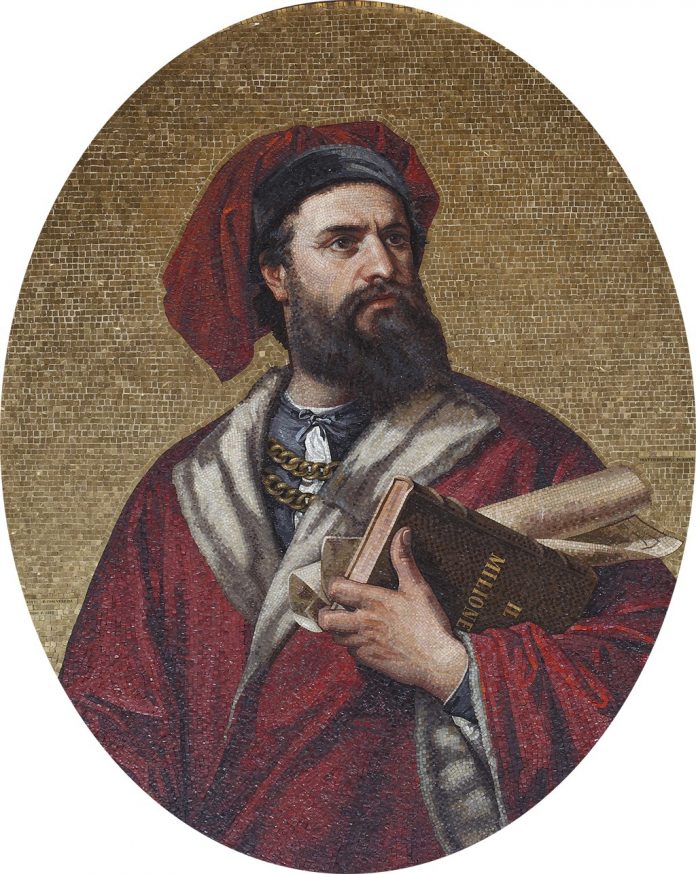On Thursday evening, the Italian Language department held a seminar about Marco Polo. The visiting lecturer who delivered the seminar, Giuseppe Gazzola, associate professor in the department of European Languages, Literatures and Cultures at Stony Brook University, was a former classmate and friend of Daniel Leisawitz, assistant professor of Italian and director of Italian Studies at Muhlenberg College. Leisawitz first met Gazzola when he began to pursue a Ph.D. in Italian at Yale. At that time, Gazzola was further along in his studies than Leisawitz, and the latter recalls Gazzola as being kind and helpful. During Leisawitz’s introduction of Gazzola, he conveyed a deep reverence for his colleague.
Gazzola spoke about who Marco Polo was, what he did and how perceptions of Marco Polo have changed over time. Gazzola admitted that he had once incorrectly examined Marco Polo and the myth surrounding him, originally through the same lens as that usually used for Christopher Columbus. Later, Gazzola went on to say that at the time of Columbus, Marco Polo was not yet a household name, despite the large role that Polo played in the Italian government. Gazzola went on to relay a bit of Polo’s story and role in the Italian government and Venetian army during his life in the late thirteenth and early fourteenth centuries. Despite having preceded and allegedly inspired Columbus, Polo would not be recognized until the twentieth century, when interest in the late Marco Polo surged.
“I thought it was interesting how people didn’t believe Marco Polo’s stories for the longest time,” said Emma Roppo ’23, commenting on one of the topics of the lecture.
“I thought it was interesting how people didn’t believe Marco Polo’s stories for the longest time.”
Gazzola credits Polo’s eventual rise to recognition as being tied to the increased knowledge of global imperial expansion in the early twentieth century.
However, the majority of Gazzola’s seminar sought to examine Marco Polo’s first-hand recounts of his travels and the text that he wrote, which would later go on to inspire future endeavors.
As was the message of Gazzola’s lecture, not all text (specifically about Marco Polo) is reliable; therefore, it should seldom be taken for gospel. Giovanni Battista Ramusio, a close friend and fellow author whom Marco Polo met while in Genoese prison, aimed to help expand the body of texts on Marco Polo. Romusio, explained Gazzola, “wanted to reconstruct the most complete text possible with the most detail and thus [make it] more interesting to all readers, making a great effort to prove the veracity of the travels.”
Gazzola expanded on this by saying that Ramusio’s accounts of Polo’s endeavors are not inherently false, but rather are embellished. Ramusio gives Polo an increased sense of grandeur that even Polo himself did not seek.
While it is imperative to learn the culture and history relevant to the language and its users, the seminar was also valuable for students who don’t take any Italian courses because its overarching message had very little to do with Marco Polo. In closing, Gazzola said, “okay, so the story of this, why I’ve kept you in a room for about […] an hour, [is] to tell you that the way in which we read a bunch of manuscripts depends on what we want to get out of them. It’s not particularly new, but this is an interesting case study to see how precisely a historical tradition, be it of a single volume or the canon of a national tradition, is constructed, is considered, is interpreted and modified according to the scopes that the interpreters of the canon want to assert.”
“It’s not particularly new, but this is an interesting case study to see how precisely a historical tradition, be it of a single volume or the canon of a national tradition, is constructed, is considered, is interpreted and modified according to the scopes that the interpreters of the canon want to assert.”
Following the seminar, Gazzola’s closing remarks on the topic proved most impactful to the audience. Leisawitz dubbed the seminar “a fantastic illustration of … how the interpretation of a text can change through the centuries according to what readers want to find in it, as opposed to what the text itself is trying to say.”






















